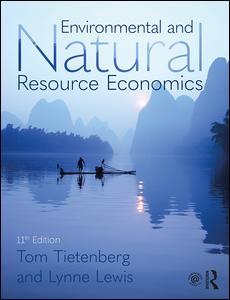Description
Environmental and Natural Resource Economics (11th Ed.)
Authors: Tietenberg Thomas H., Lewis Lynne
Language: English
Subjects for Environmental and Natural Resource Economics:
Approximative price 209.19 €
In Print (Delivery period: 13 days).
Add to cartPublication date: 08-2018
· 18.9x24.6 cm · Hardback
Approximative price 66.70 €
In Print (Delivery period: 13 days).
Add to cartPublication date: 03-2018
· 18.9x24.6 cm · Paperback
Description
/li>Contents
/li>Biography
/li>
Environmental and Natural Resource Economics is the best-selling text for natural resource economics and environmental economics courses, offering a policy-oriented approach and introducing economic theory and empirical work from the field. Students will leave the course with a global perspective of both environmental and natural resource economics and how they interact. Complemented by a number of case studies showing how underlying economic principles provided the foundation for specific environmental and resource policies, this key text highlights what can be learned from the actual experience. This new, 11th edition includes updated data, a number of new studies and brings a more international focus to the subject. Key features include:
- Extensive coverage of the major issues including climate change, air and water pollution, sustainable development, and environmental justice.
- Dedicated chapters on a full range of resources including water, land, forests, fisheries, and recyclables.
- Introductions to the theory and method of environmental economics including externalities, benefit-cost analysis, valuation methods, and ecosystem goods and services.
- Boxed ?Examples? and ?Debates? throughout the text which highlight global examples and major talking points.
The text is fully supported with end-of-chapter summaries, discussion questions, and self-test exercises in the book and multiple-choice questions, simulations, references, slides, and an instructor?s manual on the Companion Website.
1. Visions of the Future
2. The Economic Approach: Property Rights, Externalities, and Environmental Problems
3. Evaluating Trade-Offs: Benefit-Cost Analysis and Other Decision-Making Metrics
4. Valuing the Environment: Methods
5. Dynamic Efficiency and Sustainable Development
6. Depletable Resource Allocation: The Role of Longer Time Horizons, Substitutes, and Extraction Cost
7. Energy: The Transition from Depletable to Renewable Resources
8. Recyclable Resources: Minerals, Paper, Bottles, and E-Waste
9. Water: A Confluence of Renewable and Depletable Resources
10. A Locationally Fixed, Multipurpose Resource: Land
11. Storable, Renewable Resources: Forests
12. Common-Pool Resources: Commercially Valuable Fisheries
13. Ecosystem Goods and Services: Nature's Threatened Bounty
14. Economics of Pollution Control: An Overview
15. Stationary-Source Local and Regional Air Pollution
16. Climate Change
17. Mobile-Source Air Pollution
18. Water Pollution
19. Toxic Substances and Environmental Justice
20. The Quest for Sustainable Development
21. Visions of the Future Revisited
Tom Tietenberg is the Mitchell Family Professor of Economics, Emeritus at Colby College, Maine, USA.
Lynne Lewis is Elmer W. Campbell Professor of Economics at Bates College, Maine, USA.




